英语中非谓语动词的用法
- 格式:doc
- 大小:80.00 KB
- 文档页数:9
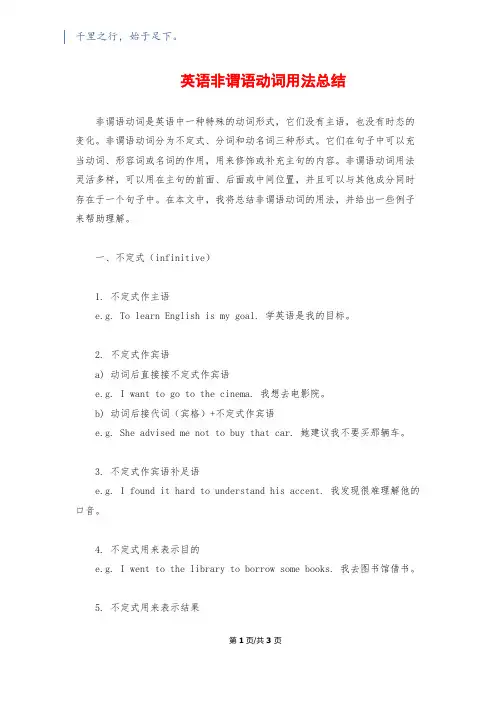
千里之行,始于足下。
英语非谓语动词用法总结非谓语动词是英语中一种特殊的动词形式,它们没有主语,也没有时态的变化。
非谓语动词分为不定式、分词和动名词三种形式。
它们在句子中可以充当动词、形容词或名词的作用,用来修饰或补充主句的内容。
非谓语动词用法灵活多样,可以用在主句的前面、后面或中间位置,并且可以与其他成分同时存在于一个句子中。
在本文中,我将总结非谓语动词的用法,并给出一些例子来帮助理解。
一、不定式(infinitive)1. 不定式作主语e.g. To learn English is my goal. 学英语是我的目标。
2. 不定式作宾语a) 动词后直接接不定式作宾语e.g. I want to go to the cinema. 我想去电影院。
b) 动词后接代词(宾格)+不定式作宾语e.g. She advised me not to buy that car. 她建议我不要买那辆车。
3. 不定式作宾语补足语e.g. I found it hard to understand his accent. 我发现很难理解他的口音。
4. 不定式用来表示目的e.g. I went to the library to borrow some books. 我去图书馆借书。
5. 不定式用来表示结果第1页/共3页锲而不舍,金石可镂。
e.g. She was too tired to continue working. 她太累了,无法继续工作。
6. 不定式用来表示原因e.g. He called me to apologize. 他打电话给我道歉。
7. 不定式用来表示方式e.g. She danced gracefully to the music. 她优雅地随着音乐跳舞。
二、分词(participle)1. 现在分词(-ing形式)a) 分词作定语,修饰名词e.g. The running dog is mine. 那只奔跑的狗是我的。
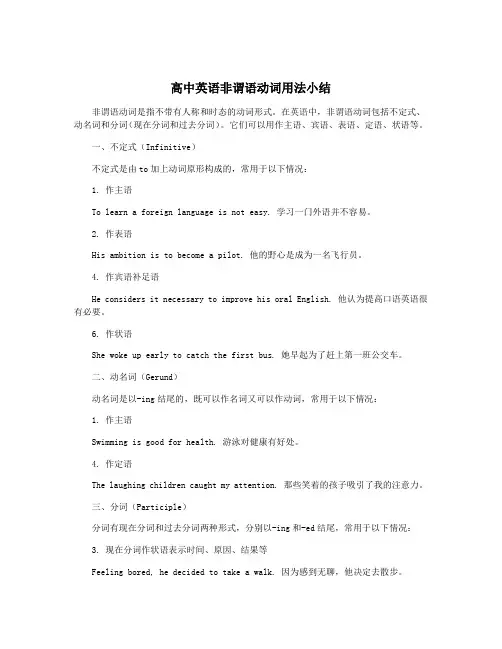
高中英语非谓语动词用法小结非谓语动词是指不带有人称和时态的动词形式。
在英语中,非谓语动词包括不定式、动名词和分词(现在分词和过去分词)。
它们可以用作主语、宾语、表语、定语、状语等。
一、不定式(Infinitive)不定式是由to加上动词原形构成的,常用于以下情况:1. 作主语To learn a foreign language is not easy. 学习一门外语并不容易。
2. 作表语His ambition is to become a pilot. 他的野心是成为一名飞行员。
4. 作宾语补足语He considers it necessary to improve his oral English. 他认为提高口语英语很有必要。
6. 作状语She woke up early to catch the first bus. 她早起为了赶上第一班公交车。
二、动名词(Gerund)动名词是以-ing结尾的,既可以作名词又可以作动词,常用于以下情况:1. 作主语Swimming is good for health. 游泳对健康有好处。
4. 作定语The laughing children caught my attention. 那些笑着的孩子吸引了我的注意力。
三、分词(Participle)分词有现在分词和过去分词两种形式,分别以-ing和-ed结尾,常用于以下情况:3. 现在分词作状语表示时间、原因、结果等Feeling bored, he decided to take a walk. 因为感到无聊,他决定去散步。
5. 现在分词或过去分词作宾语补足语I saw him driving his new car. 我看到他开着他的新车。
总结:1. 不定式和动名词不能作定语,分词可以;2. 不定式和分词都有现在和过去两种形式,动名词只有现在形式;3. 不定式和动名词只能用于名词后做宾语,分词还可以修饰主语或作状语;4. 不定式和分词有时态,动名词没有。
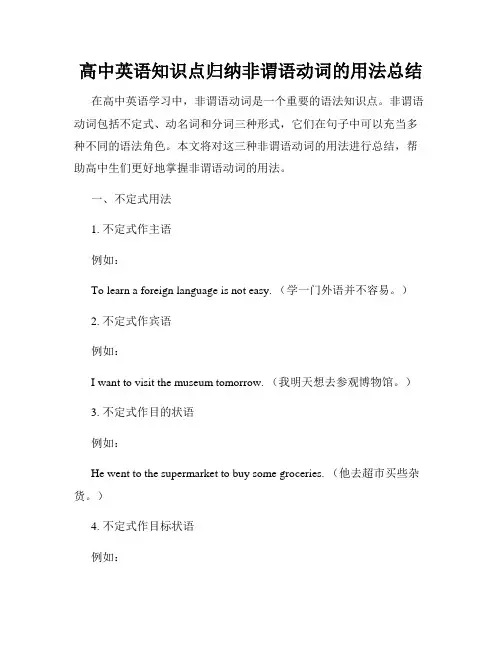
高中英语知识点归纳非谓语动词的用法总结在高中英语学习中,非谓语动词是一个重要的语法知识点。
非谓语动词包括不定式、动名词和分词三种形式,它们在句子中可以充当多种不同的语法角色。
本文将对这三种非谓语动词的用法进行总结,帮助高中生们更好地掌握非谓语动词的用法。
一、不定式用法1. 不定式作主语例如:To learn a foreign language is not easy. (学一门外语并不容易。
)2. 不定式作宾语例如:I want to visit the museum tomorrow. (我明天想去参观博物馆。
)3. 不定式作目的状语例如:He went to the supermarket to buy some groceries. (他去超市买些杂货。
)4. 不定式作目标状语例如:We need to study hard to pass the exam. (为了通过考试,我们需要努力学习。
)5. 不定式作定语例如:The girl to my left is my best friend. (我左边的那个女孩是我最好的朋友。
)二、动名词用法1. 动名词作主语例如:Swimming is my favorite sport. (游泳是我最喜欢的运动。
)2. 动名词作宾语例如:He enjoys playing basketball. (他喜欢打篮球。
)3. 动名词作介词宾语例如:She is good at dancing. (她擅长跳舞。
)4. 动名词作宾语补足语例如:I find it difficult to understand his speech. (我觉得理解他的演讲很困难。
)5. 动名词作定语例如:The running water sounds so relaxing. (流水的声音听起来很放松。
)三、分词用法1. 现在分词作定语例如:The book on the table is mine. (桌子上的那本书是我的。
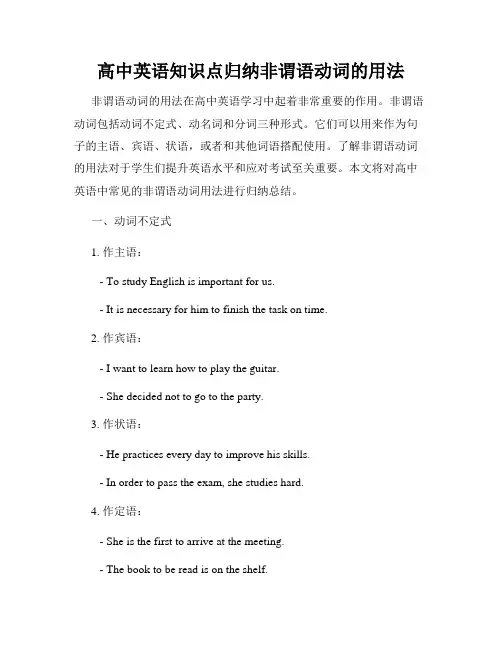
高中英语知识点归纳非谓语动词的用法非谓语动词的用法在高中英语学习中起着非常重要的作用。
非谓语动词包括动词不定式、动名词和分词三种形式。
它们可以用来作为句子的主语、宾语、状语,或者和其他词语搭配使用。
了解非谓语动词的用法对于学生们提升英语水平和应对考试至关重要。
本文将对高中英语中常见的非谓语动词用法进行归纳总结。
一、动词不定式1. 作主语:- To study English is important for us.- It is necessary for him to finish the task on time.2. 作宾语:- I want to learn how to play the guitar.- She decided not to go to the party.3. 作状语:- He practices every day to improve his skills.- In order to pass the exam, she studies hard.4. 作定语:- She is the first to arrive at the meeting.- The book to be read is on the shelf.5. 作表语:- My dream is to become a doctor.- The important thing is to keep calm.6. 作补语:- I need you to help me with the project.- He made her laugh.二、动名词1. 作主语:- Learning a new language requires patience. - Swimming is good for health.2. 作宾语:- I enjoy reading books in my free time.- She admitted stealing the money.3. 作状语:- He left without saying goodbye.- She passed the test by studying hard.4. 作定语:- The running water is very clean.- I heard someone singing in the distance.5. 作表语:- His favorite hobby is playing basketball.- The key to success is hard work.6. 作补语:- I started regretting not studying harder.- They kept us waiting for hours.三、分词1. 现在分词(-ing形式):- The running boy is my brother.- She saw a smoking man on the street.2. 过去分词(-ed/-en形式):- The broken vase needs to be replaced.- They were excited by the surprising news.3. 作状语:- Enjoying the beautiful scenery, we went for a walk.- Being well-prepared, she felt confident in the interview.4. 作定语:- The lost cat was found by its owner.- The written report should be handed in by tomorrow.5. 作补语:- She was surprised to find her car stolen.- I felt exhausted after running for an hour.综上所述,高中英语中的非谓语动词有动词不定式、动名词和分词三种形式,它们在句子中能够充当不同的成分,起到丰富语言表达和提高语言准确性的作用。
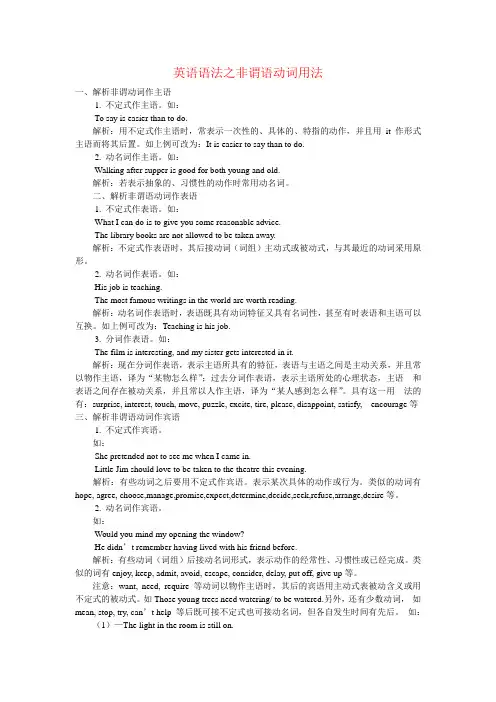
英语语法之非谓语动词用法一、解析非谓动词作主语1. 不定式作主语。
如:To say is easier than to do.解析:用不定式作主语时,常表示一次性的、具体的、特指的动作,并且用it作形式主语而将其后置。
如上例可改为:It is easier to say than to do.2. 动名词作主语。
如:Walking after supper is good for both young and old.解析:若表示抽象的、习惯性的动作时常用动名词。
二、解析非谓语动词作表语1. 不定式作表语。
如:What I can do is to give you some reasonable advice.The library books are not allowed to be taken away.解析:不定式作表语时,其后接动词(词组)主动式或被动式,与其最近的动词采用原形。
2. 动名词作表语。
如:His job is teaching.The most famous writings in the world are worth reading.解析:动名词作表语时,表语既具有动词特征又具有名词性,甚至有时表语和主语可以互换。
如上例可改为:Teaching is his job.3. 分词作表语。
如:The film is interesting, and my sister gets interested in it.解析:现在分词作表语,表示主语所具有的特征,表语与主语之间是主动关系,并且常以物作主语,译为“某物怎么样”;过去分词作表语,表示主语所处的心理状态,主语和表语之间存在被动关系,并且常以人作主语,译为“某人感到怎么样”。
具有这一用法的有:surprise, interest, touch, move, puzzle, excite, tire, please, disappoint, satisfy, encourage等三、解析非谓语动词作宾语1. 不定式作宾语。

千里之行,始于足下。
英语非谓语动词用法总结非谓语动词是指动词的非时态形式,包括不定式、现在分词和过去分词。
非谓语动词可以作为动词、形容词或副词使用。
以下是对英语非谓语动词用法的总结:1. 不定式(Infinitive):- 与to连用,构成to + 动词原形的形式。
- 作为目的、目标、原因、结果、结果状语等用途。
例如:I want to eat.(目的)She is kind enough to help me.(结果)2. 现在分词(Present Participle):- 以-ing结尾的形式。
- 常用作主动语态和进行时态的动词。
例如:I saw him running in the park.(主动语态)She is reading a book.(进行时态)3. 过去分词(Past Participle):- 以-ed、-en、-d、-t、-n、-ne等形式结尾。
- 常用作被动语态和完成时态的动词。
例如:The car was stolen yesterday.(被动语态)They have finished the project.(完成时态)注意:有些动词可以作为不定式、现在分词和过去分词使用,例如:Ilike swimming.(不定式)The swimming pool is closed.(现在分词)The swum race was intense.(过去分词)第1页/共2页锲而不舍,金石可镂。
此外,非谓语动词还有一些特殊的用法和结构,包括不定式的被动形式、独立结构、状语从句、动名词(-ing形式)和不定式的短语等。
总之,非谓语动词在英语语法中发挥重要作用,熟练掌握其用法对于正确使用英语具有重要意义。
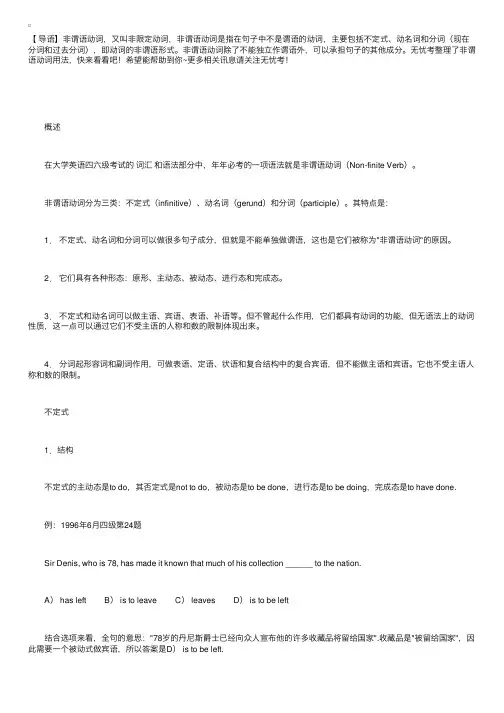
【导语】⾮谓语动词,⼜叫⾮限定动词,⾮谓语动词是指在句⼦中不是谓语的动词,主要包括不定式、动名词和分词(现在分词和过去分词),即动词的⾮谓语形式。
⾮谓语动词除了不能独⽴作谓语外,可以承担句⼦的其他成分。
⽆忧考整理了⾮谓语动词⽤法,快来看看吧!希望能帮助到你~更多相关讯息请关注⽆忧考! 概述 在⼤学英语四六级考试的词汇和语法部分中,年年必考的⼀项语法就是⾮谓语动词(Non-finite Verb)。
⾮谓语动词分为三类:不定式(infinitive)、动名词(gerund)和分词(participle)。
其特点是: 1.不定式、动名词和分词可以做很多句⼦成分,但就是不能单独做谓语,这也是它们被称为"⾮谓语动词"的原因。
2.它们具有各种形态:原形、主动态、被动态、进⾏态和完成态。
3.不定式和动名词可以做主语、宾语、表语、补语等。
但不管起什么作⽤,它们都具有动词的功能,但⽆语法上的动词性质,这⼀点可以通过它们不受主语的⼈称和数的限制体现出来。
4.分词起形容词和副词作⽤,可做表语、定语、状语和复合结构中的复合宾语,但不能做主语和宾语。
它也不受主语⼈称和数的限制。
不定式 1.结构 不定式的主动态是to do,其否定式是not to do,被动态是to be done,进⾏态是to be doing,完成态是to have done. 例:1996年6⽉四级第24题 Sir Denis, who is 78, has made it known that much of his collection ______ to the nation. A) has left B) is to leave C) leaves D) is to be left 结合选项来看,全句的意思:"78岁的丹尼斯爵⼠已经向众⼈宣布他的许多收藏品将留给国家".收藏品是"被留给国家",因此需要⼀个被动式做宾语,所以答案是D) is to be left. 2.不定式做主语 例:1995年1⽉四级第55题 It is not unusual for workers in that region _________. A) to be paid more than a month later B) to be paid later than more a month C) to pay later than a month more D) to pay later more than a month it 在句中作形式主语。
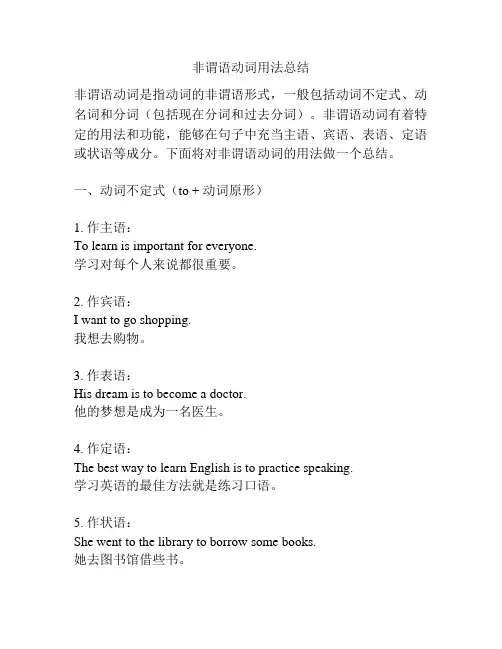
非谓语动词用法总结非谓语动词是指动词的非谓语形式,一般包括动词不定式、动名词和分词(包括现在分词和过去分词)。
非谓语动词有着特定的用法和功能,能够在句子中充当主语、宾语、表语、定语或状语等成分。
下面将对非谓语动词的用法做一个总结。
一、动词不定式(to + 动词原形)1. 作主语:To learn is important for everyone.学习对每个人来说都很重要。
2. 作宾语:I want to go shopping.我想去购物。
3. 作表语:His dream is to become a doctor.他的梦想是成为一名医生。
4. 作定语:The best way to learn English is to practice speaking.学习英语的最佳方法就是练习口语。
5. 作状语:She went to the library to borrow some books.她去图书馆借些书。
二、动名词(Ving形式)1. 作主语:Swimming is good for health.游泳对健康有好处。
2. 作宾语:I enjoy reading novels in my free time.我喜欢在空闲时间读小说。
3. 作表语:Her favorite hobby is drawing.她最喜欢的爱好是画画。
4. 作定语:I saw a man reading a newspaper in the park.我看到一个在公园里读报纸的人。
5. 作状语:She improved her English by practicing every day.她通过每天练习提高了她的英语。
三、分词(普通形式:Ving形式或者过去分词形式)1. 作定语:The smiling girl is my sister.那个笑着的女孩是我的妹妹。
2. 作补语:I saw him running in the race.我看到他在比赛中奔跑。
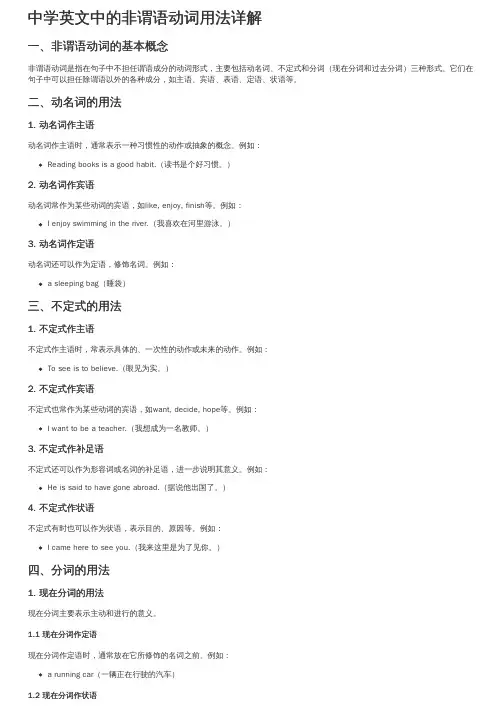
中学英文中的非谓语动词用法详解一、非谓语动词的基本概念非谓语动词是指在句子中不担任谓语成分的动词形式,主要包括动名词、不定式和分词(现在分词和过去分词)三种形式。
它们在句子中可以担任除谓语以外的各种成分,如主语、宾语、表语、定语、状语等。
二、动名词的用法1. 动名词作主语动名词作主语时,通常表示一种习惯性的动作或抽象的概念。
例如:Reading books is a good habit.(读书是个好习惯。
)2. 动名词作宾语动名词常作为某些动词的宾语,如like, enjoy, finish等。
例如:I enjoy swimming in the river.(我喜欢在河里游泳。
)3. 动名词作定语动名词还可以作为定语,修饰名词。
例如:a sleeping bag(睡袋)三、不定式的用法1. 不定式作主语不定式作主语时,常表示具体的、一次性的动作或未来的动作。
例如:To see is to believe.(眼见为实。
)2. 不定式作宾语不定式也常作为某些动词的宾语,如want, decide, hope等。
例如:I want to be a teacher.(我想成为一名教师。
)3. 不定式作补足语不定式还可以作为形容词或名词的补足语,进一步说明其意义。
例如:He is said to have gone abroad.(据说他出国了。
)4. 不定式作状语不定式有时也可以作为状语,表示目的、原因等。
例如:I came here to see you.(我来这里是为了见你。
)四、分词的用法1. 现在分词的用法现在分词主要表示主动和进行的意义。
1.1 现在分词作定语现在分词作定语时,通常放在它所修饰的名词之前。
例如:a running car(一辆正在行驶的汽车)1.2 现在分词作状语现在分词作状语时,通常表示伴随的动作或状态。
例如:Standing by the window, he looked out at the garden.(他站在窗边,望着花园。
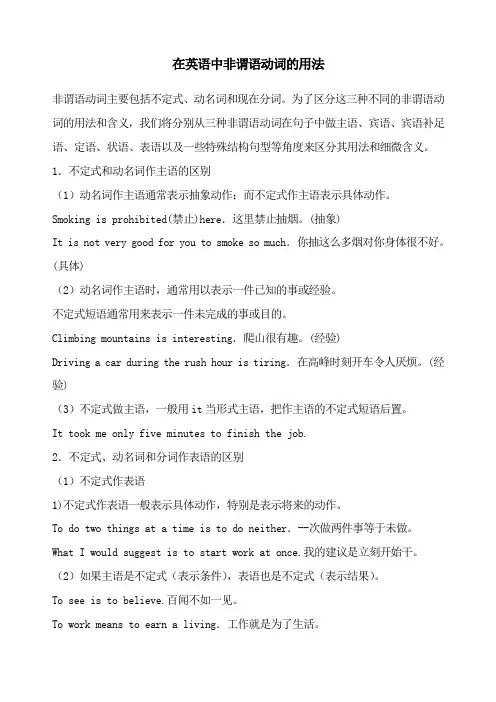
在英语中非谓语动词的用法非谓语动词主要包括不定式、动名词和现在分词。
为了区分这三种不同的非谓语动词的用法和含义,我们将分别从三种非谓语动词在句子中做主语、宾语、宾语补足语、定语、状语、表语以及一些特殊结构句型等角度来区分其用法和细微含义。
1.不定式和动名词作主语的区别(1)动名词作主语通常表示抽象动作;而不定式作主语表示具体动作。
Smoking is prohibited(禁止)here.这里禁止抽烟。
(抽象)It is not very good for you to smoke so much.你抽这么多烟对你身体很不好。
(具体)(2)动名词作主语时,通常用以表示一件已知的事或经验。
不定式短语通常用来表示一件未完成的事或目的。
Climbing mountains is interesting.爬山很有趣。
(经验)Driving a car during the rush hour is tiring.在高峰时刻开车令人厌烦。
(经验)(3)不定式做主语,一般用it当形式主语,把作主语的不定式短语后置。
It took me only five minutes to finish the job.2.不定式、动名词和分词作表语的区别(1)不定式作表语1)不定式作表语一般表示具体动作,特别是表示将来的动作。
To do two things at a time is to do neither.--次做两件事等于未做。
What I would suggest is to start work at once.我的建议是立刻开始干。
(2)如果主语是不定式(表示条件),表语也是不定式(表示结果)。
To see is to believe.百闻不如一见。
To work means to earn a living.工作就是为了生活。
(3)如果主语是以aim, duty, hope, idea, happiness, job, plan, problem,purpose, thing, wish等为中心的名词,或以what引导的名词性从句,不定式作表语是对主语起补充说明作用。
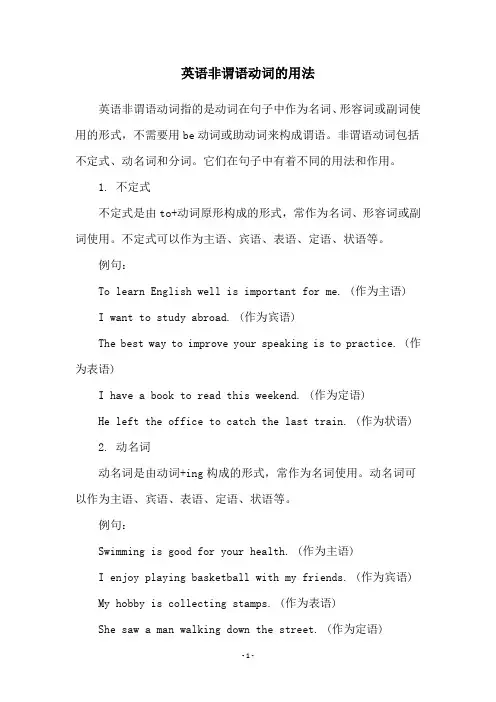
英语非谓语动词的用法英语非谓语动词指的是动词在句子中作为名词、形容词或副词使用的形式,不需要用be动词或助动词来构成谓语。
非谓语动词包括不定式、动名词和分词。
它们在句子中有着不同的用法和作用。
1. 不定式不定式是由to+动词原形构成的形式,常作为名词、形容词或副词使用。
不定式可以作为主语、宾语、表语、定语、状语等。
例句:To learn English well is important for me. (作为主语) I want to study abroad. (作为宾语)The best way to improve your speaking is to practice. (作为表语)I have a book to read this weekend. (作为定语)He left the office to catch the last train. (作为状语) 2. 动名词动名词是由动词+ing构成的形式,常作为名词使用。
动名词可以作为主语、宾语、表语、定语、状语等。
例句:Swimming is good for your health. (作为主语)I enjoy playing basketball with my friends. (作为宾语) My hobby is collecting stamps. (作为表语)She saw a man walking down the street. (作为定语)He did his homework while listening to music. (作为状语) 3. 分词分词有两种形式:现在分词和过去分词。
现在分词是由动词+ing 构成的形式,过去分词是由动词的过去分词形式构成的形式。
分词可以作为形容词和状语使用。
例句:The running man is my brother. (现在分词作为形容词)The broken vase is on the floor. (过去分词作为形容词)He left the room, closing the door behind him. (现在分词作为状语)Having finished his homework, he went to bed. (过去分词作为状语)总之,非谓语动词在英语中用法多样,需要根据具体情况来判断其作用和形式。
高中英语非谓语动词用法小结非谓语动词指的是动词的非限定形式,不受主语和谓语的人称和数的限制。
在英语中,非谓语动词主要有不定式、动名词和分词三种形式。
非谓语动词的用法较为灵活,包括作主语、作宾语、作状语等多种用法。
本文将对高中英语非谓语动词的用法进行简要总结。
一、不定式的用法:1. 作主语:动词不定式常常作为句子的主语,可以用it作形式主语,把不定式放在句尾,句子采用完全倒装句的形式,例如:It is dangerous to swim in the river.去河里游泳是危险的。
2. 作宾语:动词不定式常常作为及物动词的宾语,例如:I want to go shopping.我想去购物。
3. 作表语:动词不定式作表语,和主语之间用系动词be连系,例如:Her dream is to become a doctor.她的梦想是成为一名医生。
4. 作状语:动词不定式可以作状语表示目的、原因、结果等,例如:He went to the library to borrow some books.他去图书馆借书。
二、动名词的用法:Reading is my favorite hobby.阅读是我最喜欢的爱好。
His job is teaching English.他的工作是教英语。
1. 现在分词作定语:现在分词常常作为名词前的定语,修饰名词,例如:I saw a girl playing the piano in the park.我在公园里看到一个女孩在弹钢琴。
Seeing the accident, he called the police immediately.看到事故,他立刻报警了。
非谓语动词的种类与用法非谓语动词是指不作为句子的谓语,通常不包含人称和数的变化。
在英语中,非谓语动词有不同的形式和用法。
本文将介绍非谓语动词的种类与用法,并提供相关的例句,以帮助读者更好地理解和运用非谓语动词。
一、不定式(Infinitive)不定式是非谓语动词中最常见的一种形式,它可以用来表示目的、结果、原因、方式等。
不定式的一般形式是“to + 动词原形”。
1. 表示目的:I bought some apples to make a pie.(我买了一些苹果来做派。
)She studies hard in order to get a scholarship.(她为了获得奖学金而努力学习。
)2. 表示结果:He was so tired as to fall asleep immediately.(他太累了,以至于立刻入睡。
)The monkey jumped off the tree to catch the banana.(猴子从树上跳下来,去抓香蕉。
)3. 表示原因:I am here to help you.(我在这里是为了帮助你。
)He went to the supermarket to buy some groceries.(他去超市买些杂货。
)4. 表示方式:She spoke softly to avoid waking up the baby.(她小声说话以免把婴儿吵醒。
)He practiced every day to improve his tennis skills.(他每天练习以提高他的网球技能。
)二、动名词(Gerund)动名词是以-ing 结尾的动词形式,作为非谓语动词时可以作主语、宾语、表语和宾补。
1. 作主语:Swimming is my favorite sport.(游泳是我最喜欢的运动。
)Reading books is a good way to relax.(读书是一种很好的放松方式。
非谓语动词的用法总结非谓语动词是英语中一种特殊的动词形式,它不具备时态和人称的变化,常用的非谓语动词有动词不定式、动名词和分词。
非谓语动词在句子中可以作多种不同的成分,包括主语、宾语、定语等,下面将详细总结非谓语动词的用法。
动词不定式1.作主语:–To work is important for everyone.–To study every day is necessary.2.作宾语:–She wants to learn Mandarin.–He decided to visit his parents.3.作定语:–This is a book to read.–I need a pen to write with.动名词1.作主语:–Reading is my favorite hobby.–Swimming is good for health.2.作宾语:–She enjoys listening to music.–He avoids eating fast food.3.作定语:–She bought a dress made of silk.–They prefer a hotel offering free breakfast.分词1.现在分词作定语:–The falling leaves covered the ground.–The crying baby needs attention.2.过去分词作定语:–The broken window was fixed.–The written report was submitted.总的来说,非谓语动词在句子中具有多种用法,能够起到不同的语法成分作用,灵活运用非谓语动词可以使句子更加简洁明了,提高语言表达的质量。
希望以上总结对理解和运用非谓语动词有所帮助。
非谓语动词用法归纳(语法)大家好,今天我们来聊聊非谓语动词的用法。
非谓语动词就是不直接跟在主语后面的动词,它们可以表示动作的状态、时间、原因、目的等等。
那么,非谓语动词有哪些用法呢?我们一起来看看吧!1. 动词不定式动词不定式是最常见的非谓语动词形式,它由“to”加上动词原形构成。
例如:I want to go home.(我想回家。
)She likes to read books.(她喜欢读书。
)They need to finish their homework.(他们需要完成作业。
)2. 动名词动名词是由动词加上“-ing”构成的名词,它可以表示动作的状态或者作为主语、宾语等。
例如:Swimming is my favorite sport.(游泳是我最喜欢的运动。
)I enjoy reading books in my spare time.(我喜欢在业余时间看书。
)He suggested having a picnic in the park.(他建议在公园里野餐。
)3. 过去分词过去分词是由动词加上“-ed”构成的形容词,它可以表示动作的完成或者作为定语、状语等。
例如:The movie was interesting.(这部电影很有趣。
)He has finished his work.(他已经完成了工作。
)The broken vase should be thrown away.(那个打破的花瓶应该扔掉。
)4. 现在分词现在分词是由动词加上“-ing”构成的形容词,它可以表示动作正在进行或者作为定语、状语等。
例如:Walking in the park is good for your health.(在公园里散步对身体有好处。
)She is studying English at the moment.(她现在正在学英语。
)The running water sounds very soothing.(流水声听起来很舒缓。
非谓语动词的用法总结非谓语动词是指不具备人称、数和时态等语法特征的动词形式,主要包括动词不定式(to do)、动名词(doing)和分词(done)。
在英语语法中,非谓语动词常常用于多种不同的结构中,具有独特的功能和用法。
本文将对非谓语动词的用法进行总结,并提供相关例句来加深理解。
一、动词不定式动词不定式是非谓语动词的一种形式,一般由to + 动词原形构成。
动词不定式可以作为名词、形容词或副词的补语,也可以在句子中作主语、宾语、表语和宾补等。
以下是动词不定式的几种主要用法:1. 作主语To swim is my favorite activity.2. 作宾语She wants to eat dinner at home.3. 作表语Her dream is to become a doctor.4. 作定语I have a book to read this weekend.5. 作状语He went to the park to play basketball.6. 作宾补We need you to clean the room.二、动名词动名词是非谓语动词的一种形式,一般由动词的现在分词形式(-ing)构成。
动名词可以作为名词的主语、宾语、定语、表语和宾补等。
以下是动名词的几种主要用法:1. 作主语Swimming is good exercise.2. 作宾语I enjoy reading books.3. 作定语We had a thrilling roller coaster ride.4. 作表语His favorite activity is dancing.5. 作宾补She kept the secret by not telling anyone.三、分词分词是非谓语动词的一种形式,一般由动词的过去分词形式(-ed 或不规则形式)或现在分词形式(-ing)构成。
分词可以作为形容词的定语,修饰名词或代词。
非谓语动词的用法总结一、非谓语动词概述非谓语动词是指不具备谓语性质的动词形式,它以独立于主谓结构的方式出现在句子中。
在英语中,非谓语动词包括不定式、现在分词和过去分词。
本文将总结非谓语动词的用法,并重点讨论其作为状语、定语和补足语的功能。
二、不定式的用法1. 作为目的状语:不定式常用来表示动作或状态的目的。
例如:“I went to the store to buy some groceries.”(我去商店买些杂货)2. 作为结果状语:不定式有时表示某个动作或状态发生的结果。
例如:“He worked hard to climb the mountain.”(他努力工作才成功登上山顶)3. 作为原因状语:不定式可以用来表示某个行为或状态发生的原因。
例如:“She stayed up late to finish her homework.”(她熬夜完成家庭作业)4. 作为条件状语:在条件句中,常使用"if"引导一个带有不定式的从句。
例如:“If you want to succeed, you must work hard.”(如果你想成功,就必须努力工作)5. 作为名词性质:不定式可以充当名词的角色,用来作主语、宾语、表语等。
例如:“To travel is my dream.”(旅行是我的梦想)6. 作为定语:不定式可以修饰名词或代词,起到定语的作用。
例如:“Thebook to read is on the shelf.”(要读的那本书在书架上)三、现在分词的用法1. 作为形容词:现在分词可用于描述一个正在进行或具有某种性质的人或事物。
例如:“She saw a crying baby in the park.”(她看到了公园里哭泣的婴儿)2. 作为状语:现在分词可以表示时间,原因,条件等意义。
例如:“Walking by the river, he felt relaxed.”(边走边看河流,他觉得很放松)3. 和系动词连用:现在分词可以和系动词连用,构成谓语部分。
非谓语动词主要包括不定式、动名词和现在分词。
为了区分这三种不同的非谓语动词的用法和含义,我们将分别从三种非谓语动词在句子中做主语、宾语、宾语补足语、定语、状语、表语以及一些特殊结构句型等角度来区分其用法和细微含义。
1.不定式和动名词作主语的区别(1)动名词作主语通常表示抽象动作;而不定式作主语表示具体动作。
Smoking is prohibited(禁止)here.这里禁止抽烟。
(抽象)It is not very good for you to smoke so much.你抽这么多烟对你身体很不好。
(具体)(2)动名词作主语时,通常用以表示一件已知的事或经验。
不定式短语通常用来表示一件未完成的事或目的。
Climbing mountains is interesting.爬山很有趣。
(经验)Driving a car during the rush hour is tiring.在高峰时刻开车令人厌烦。
(经验)(3)不定式做主语,一般用it当形式主语,把作主语的不定式短语后置。
It took me only five minutes to finish the job.2.不定式、动名词和分词作表语的区别(1)不定式作表语1)不定式作表语一般表示具体动作,特别是表示将来的动作。
To do two things at a time is to do neither.--次做两件事等于未做。
What I would suggest is to start work at once.我的建议是立刻开始干。
(2)如果主语是不定式(表示条件),表语也是不定式(表示结果)。
To see is to believe.百闻不如一见。
To work means to earn a living.工作就是为了生活。
(3)如果主语是以aim,duty,hope,idea,happiness,job,plan,problem,purpose,thing,wish等为中心的名词,或以what引导的名词性从句,不定式作表语是对主语起补充说明作用。
His wish is to buy a luxurious car in the near future.他的希望是在不远的将来买一辆豪华轿车。
The function of Louis Sullivan's architecture was to provide large uninterrupted floor areas and to allow ample light into the interior.The most important thing is to negotiate with them about the future of the plant.(2)动名词作表语:动名词作表语,表示抽象的一般性的行为。
Our work is serving the people.我们的工作是为人民服务。
His hobby is collecting stamps.他的爱好是集邮。
注:动名词作表语时与进行时态中的现在分词形式相同,但其所属结构迥异,进行时态说明动作是由主语完成的。
动名词做表语,说明主语的性质或情况。
People cannot but feel puzzled,for they simply cannot understand how he could have made such a stupid mistake.His victory in the final was no more convincing than I had expected.(3)分词作表语分词做表语有两种情况,一种是现在分词做表语,一种是过去分词做表语,这两者区别是考试中经常考到的地方。
一般来说,表示心理状态的动词如excite,interest等都是及物动词,汉语意思不是“激动”,“高兴”,而是“使激动”、“使高兴”,因而现在分词应该是“令人激动的”、“令人高兴的”,过去分词则是“感到激动的”和“感到高兴的”。
所以,凡表示“令人……的”都是-ing形式,凡是表示“感到……”都用-ed形式。
换句话说,若人对……感兴趣,就是somebody is interested in...,若人/物本身有兴趣时,就是说sb./sth. is interesting.这类词常见的有:interesting使人感到高兴--interested感到高兴的exciting令人激动的--excited感到激动的delighting令人高兴的--delighted感到高兴的disappointing令人失望的--disappointed感到失望的encouraging令人鼓舞的--encouraged感到鼓舞的pleasing令人愉快的--pleased感到愉快的puzzling令人费解的--puzzled感到费解的satisfying令人满意的---satisfied感到满意的surprising令人惊异的--surprised感到惊异的worrying令人担心的--worried感到担心的Travelling is interesting but tiring.旅行是有趣的,但是使人疲劳。
The pupils will get confused if they are made to learn too much.如果要学生学得太多,他们会感到糊涂的。
The argument is very convincing.他的论点很令人信服。
They were very excited at the news.听到这个消息,他们非常激动。
3.不定式和动名词作宾语的区别英语中大多数动词既可跟不定式,也可跟动名词作直接宾语,但有些动词要求:(1)不定式做宾语和宾语补足语1)下面的动词要求不定式做宾语attempt企图enable能够neglect忽视afford负担得起demand要求long渴望arrange安排destine注定mean意欲,打算begin开始expect期望omit忽略,漏appear似乎,显得determine决定manage设法cease停止hate憎恨,厌恶pretend假装ask问dread害怕need需要agree同意desire愿望love爱swear宣誓volunteer志愿wish希望bear承受endeavor努力offer提供beg请求fail不能plan计划bother扰乱;烦恼forget忘记prefer喜欢,宁愿care关心,喜欢happen碰巧prepare准备decide决定learn学习regret抱歉,遗憾choose选择hesitate犹豫profess表明claim要求hope希望promise承诺,允许start开始undertake承接want想要consent同意,赞同intend想要refuse拒绝decide决定learn学习vow起contrive设法,图谋incline有…倾向propose提议seek找,寻觅try试图2)下面的动词要求不定式做宾补:动词+宾语+动词不定式ask要求,邀请get请,得到prompt促使allow允许forbid禁止prefer喜欢,宁愿announce宣布force强迫press迫使bride 收买inspire鼓舞request请求assist协助hate憎恶pronounce断定,表示advise劝告exhort告诫,勉励pray请求authorize授权,委托help帮助recommend劝告,推荐bear容忍implore恳求remind提醒beg请求induce引诱report报告compel强迫invite吸引,邀请,summon传唤command命令intend想要,企图show 显示drive驱赶mean意欲,打算train训练cause引起instruct指示require要求deserve应受leave使,让tell告诉direct指导like喜欢tempt劝诱entitle有资格order命令warn告诫enable使能够need需要urge激励,力说encourage鼓励oblige不得不want想要condemn指责,谴责lead引起,使得teach教entreat恳求permit允许wish希望(2)有少数动词只能用动名词作宾语acknowledge承认,自认cease 停止mention说到,讲到admit 承认tolerate忍受dislike不喜欢,讨厌advocate:提倡,主张complete完成dread可怕appreciate 感激,欣赏confess坦白endure忍受avoid避免contemplate细想enjoy享有,喜爱bear忍受defer拖延envy嫉妒can't help不禁delay延迟escape逃跑,逃避can't stand受不了deny否认excuse借口consider 考虑detest嫌恶fancy幻想,爱好favor 造成,偏爱mind 介意repent悔悟figure描绘,计算miss错过resent怨恨finish完成,结束不得pardon原谅,饶恕resist抵抗,阻止forgive原谅permit 允许resume恢复imagine设想postpone延迟,延期risk冒险involve卷入,包含practise 实行,实践suggest建议hate讨厌prevent阻止save营救,储蓄keep保持quit放弃停止stand坚持,忍受loathe非常讨厌,厌恶recall回想例如:I appreciate having been given the opportunity to study abroad two years ago.我很感激两年前给我出国学习的机会。
(3)有些动词后使用动名词和动词不定式作宾语的差别1)forget to do 忘记要去做某事(此事未做)forget doing忘记做过某事(此事已做过或已发生)2)stop to do 停止、中断(某件事),目的是去做另一件事stop doing 停止正在或经常做的事3)remember to do 记住去做某事(未做)remember doing记得做过某事(已做)4) regret to do对要做的事遗憾regret doing对做过的事遗憾、后悔5)try to do努力、企图做某事try doing试验、试一试某种办法6) mean to do打算,有意要…mean doing意味着7)go on to do 继而(去做另外一件事情)go on doing 继续(原先没有做完的事情)8)propose to do 打算(要做某事)proposing doing建议(做某事)9) like /love/hate/ prefer +to do 表示具体行为;+doing sth 表示抽象、倾向概念(注)如果这些动词前有should一词,其后宾语只跟不定式,不能跟动名词。